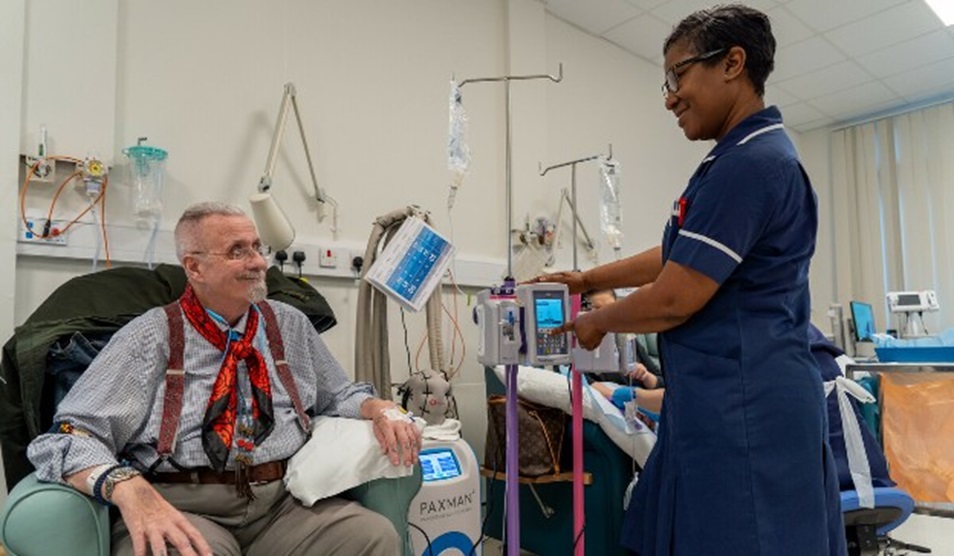Pancreatic-biliary cancer
Contact
- General Enquiries
- 020 3313 1000
Visitor Information
Translation help:
To translate this page into your preferred language, click the Google Translate icon in the top-right menu and select your desired language.
The pancreatic-biliary cancer service is part of the hepato-pancreato-biliary (HPB) unit at Hammersmith Hospital, which provides holistic care for patients with liver, pancreatic and/or biliary disorders in west London, the UK and worldwide. The hepato-pancreato-biliary (HPB) unit at Hammersmith Hospital has a long-standing commitment to providing services to patients with pancreatic, liver and/or biliary disorders. More than 800 new patients with either benign or malignant diseases are referred to our team each year.
We provide state-of-the-art diagnosis and treatment to patients with pancreatic and liver cancer, and have a world-renowned reputation for the management of chronic pancreatitis.
Conditions and treatments
Our services include:
- Diagnostic and interventional radiology
- Endoscopy
- Surgery
- Nuclear medicine
- Oncology
- Palliative care
The treatment for pancreatic cancer varies depending on where the cancer is, whether there is any spread and the age and general health of the patient. The types of treatment include:
- Surgery: There are basically two types of surgical procedures commonly performed at Hammersmith Hospital for pancreatic cancer. One, known as pylorus preserving proximal pancreoduodenectomy (PPPP), involves the removal of part of the pancreas, the duodenum and bile duct. An alternative surgery known as Whipple’s procedure involves the removal of part of the pancreas, the duodenum, bile duct and stomach.
- Endoscopic stenting: A flexible tube is passed through the mouth, down the gullet into the stomach and then through the opening that leads to the pancreas and gall bladder. A thin hollow tube called a stent can then be placed in the tube leaving the liver (bile duct) to relieve any blockages caused by the cancer.
- Radiotherapy/chemotherapy: These are occasionally helpful in cancer of the pancreas and in a few patients may play a role in treatment.
Meet the team
Surgical team
Professor Nagy Habib, clinical lead
Professor Long Jiao, MDT lead
Mr Duncan Spalding
Professor Andrea Frilling
Mr Farid Froghi
Hepato-biliary (HPB) medicine and gastroenterology
Dr Shahid Khan
Dr Panagiotis Vlavianos
Oncology
Dr Harpreet Wasan
Professor Robert Leonard
Dr Rohini Sharma
Professor Pat Price
Dr Alex Taylor
Radiology
Dr Adil Al-Nahhas, nuclear medicine
Dr Alison Graham
Dr James Jackson, interventional radiology lead
Professor Edward Leen, interventional ultrasound
HPB pathology
Dr Patrizia Cohen
Dr Roberto Dina
Dr Robert Goldin
HPB anaesthetics
Dr Stephen Brett
Dr David Harris
Dr Susan Kirby
MDT coordinator
Raha Mohamed
Clinical nurse specialist
Maria Mcguigan
Patient information
Admission and access
The surgical team sees patients within 24 hours of referral. The comprehensive multidisciplinary team incorporates 30 consultants working together from all specialties such as gastroenterology, radiotherapy, oncology, pathology and palliative care. Following initial consultation we will admit you within 48 hours. You are encouraged to contact us by telephone should you want to be seen urgently or before your scheduled clinical appointment. Following intensive diagnostic tests and discussion your first treatment will be performed within two weeks of admission.
Nutritional assessment
When you are admitted to hospital, your nurse will weigh you. The nurse will also ask questions about your appetite and any weight loss, and may refer you to a dietitian if necessary.
Macmillan cancer navigator service at Imperial College Healthcare NHS Trust
This is a single point of contact for cancer patients at Imperial College Healthcare NHS Trust, and their family, friends and carers. The service is here to help you to navigate your care and resolve queries that you may have. Our Navigators can access information about your appointments, connect you to appropriate services and signpost you on to further support.
They can also book you in for a telephone call back from your Clinical Nurse Specialist (CNS) if you have a question that needs clinical input.
The service is open Monday to Friday 08:30 to 16:30 excluding bank holidays. (The service is closed for training between 14.00-14.45 on Thursdays.)
Call: 020 3313 0303

